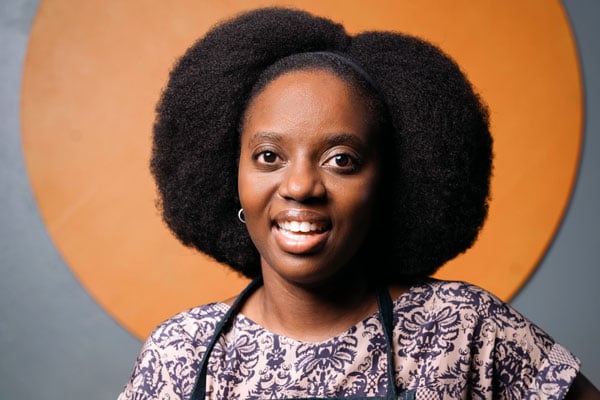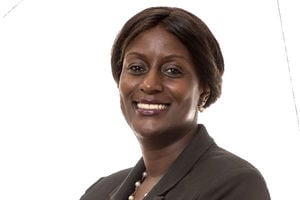
Stella Mugera went into decoration.
Transitioning from a corporate job to self-employment is bold and challenging. byline-credit:
Stella Mugera: Pursuing passion
Despite her fulfilling role as an economics policy analyst at the Uganda Local Governments (ULGA) Association, where she worked from 2008 to 2015, Mugera knew she wanted to start her own business. However, the fear of uncertain revenue streams kept her from leaping.
To Mugera, success means having the freedom to choose how you spend your time and prioritise your own goals and values, rather than being bound by external demands. It is about having the freedom to shape your life according to your desires and passions, which she could not do at her former job.
Mugera had a passion for decorating, stemming from her creativity and success in fine art in secondary school. When her contract with ULGA was up for renewal in 2015, she chose not to renew it but accepted a position as sustainability coordinator with USAID, delaying her plans.
“I spent a year at USAID and as the contract came to an end, I realised that my heart was set on entrepreneurship. I knew I could not commit to a full-time position again. Early 2017, I took a six-month break to prepare myself. By mid-year, I finally took the plunge and started Oakwood Events Uganda, marking my transition from the corporate world to entrepreneurship,” Mugera narrates.
Decorating was a completely new field for Mugera. While she was confident in her abilities, she lacked formal training and had to learn on the job.
“I searched for relevant literature from sources such as the Uganda Investment Authority and Private Sector Foundation. However, the available information was either too basic or too advanced for what I needed. I ended up relying heavily on resources from other countries, with Google playing a significant role,” Mugera says.
Although Mugera’s savings for her business were insufficient to start with, her planning background proved helpful.
“I only bought the bare essentials and hired the rest. Even with a loan, I did not want to take a large one. We used the loans to buy a few expensive, essential items. Over time, we ensured that each event, once we started to go beyond breaking even, contributed a percentage towards capital investment and loan repayment,” Mugera explains.
Six months into the business, Oakwood was invited to bid on decorations for Sheraton Hotel's 50th anniversary. Mugera and her team personalised their presentation by incorporating Sheraton’s history, winning the job over competitors.
“The event was a success despite last-minute challenges, including accommodating 200 extra guests. One attendee from a smaller event recommended us. This taught us that small opportunities can lead to bigger ones if handled professionally. Our attention to detail, including detailed invoices and formal registration, was crucial in securing this high-profile job,” Mugera says.
This was just the beginning. In 2023, Oakwood was invited to bid for the Busoga royal wedding, which required fresh flower decorations for more than 3,000 guests. The professionalism, courtesy, and ethical conduct opened this door. They successfully managed the decorations, collaborating closely with clergy and kingdom officials.
Mugera observes that starting a business requires adjusting spending to manage initial costs.
“I lived on the bare minimum for the first six to eight months, starting from scratch,” she says. She also emphasises the importance of knowing your target audience and building a brand before setting prices, as potential clients need to see your work first.
Mugera has implemented systems to enhance efficiency for her team and herself.
“Do assessments and seek mentors to learn how to work smarter. We handle one client at a time, giving our best to avoid substandard work from juggling multiple jobs. It is better to excel in one job that pays well than to spread yourself thin,” Mugera explains.

Lisa Kusiima quit her formal job for content creation. PHOTO/COURTESY OF LISA KUSIIMA
Lisa Kusiima: Finding purpose
After six years as a consultant at Aclaim Africa, a leadership and management consulting firm, Lisa Kusiima was ready to start a new career focused on creating content to build stronger families. She hatched this idea during her maternity leave.
“After the birth of my second child in 2020, I struggled with postpartum depression and began to question my calling. During this time of reflection, I discovered a course on Facebook about finding one's purpose. Through this course, I realised my purpose was to build strong families,” Kusiima recalls.
She adds: “My firstborn was still young, and I would often come home around 7pm just before he went to bed, leaving me with only about an hour together and yet I had to leave early the next morning. It felt like I was more of a visitor than a parent, and the guilt of not being present was overwhelming.”
After that maternity leave, the thought of doing the same thing and leaving her second child after only three months was unbearable. Despite her love for the job, the cost of not being with her children weighed heavily on her even when her employer provided a breastfeeding room and accommodated her early departures.
Kusiima quickly created a YouTube channel to share her content with the world.
“I informed my employer that my time at Aclaim Africa was ending. They were supportive and encouraged me to seek feedback to understand my strengths better. To focus on content creation, I requested to reduce my workdays from five to two per week, balancing motherhood with my new focus. Though it came with a pay cut, it helped me gauge my potential earnings if I left entirely,” Kusiima shares.
Even though she worked for only two days a week, she still struggled to balance content creation, work, and motherhood.
“Ultimately, I realised that no salary was worth the emotional cost of missing my children’s lives and having someone else shape their values. Despite anxiety about quitting my job, I took the leap and in 2021, I resigned,” Kusiima says.
At the start, Kusiima worried about finances. Her first video, filmed on a shaky phone with poor lighting was far from ideal. However, she saw this as part of her growth. For the first two years, she invested her own money and made mistakes, learning that focusing on a bigger purpose, like helping others, kept her motivated through challenges.
“Before starting my YouTube channel, I watched videos to understand how monetisation worked. I discovered that earning significant income from YouTube requires substantial views. I took a short course on YouTube content creation and learnt to leverage platforms such as Instagram to drive traffic. Starting an Instagram page boosted my YouTube growth,” Kusiima explains.
She is thankful for her husband’s support, especially with the camera setup, as she did not expect to build a business immediately and knowing YouTube’s monetisation requirements would take time.
“My first paid gig was a Shs240,000 ad for briquettes, which even reached Juba. During a financially uncertain moment, a stranger gifted me Shs500,000, reassuring me it was divine provision. Since then, gigs have steadily come in,” Kusiima narrates.
Because she was more present at home, Kusiima noticed small details like how they needed better curtains or more spoons in her house. Her presence also improved family dynamics, her husband felt more productive knowing she was there, which brought her joy.
With more than 33,000 followers on YouTube and 76,000 followers on Instagram, Kusiima’s schedule often becomes tight, which she says makes her feel like she is slipping back into an 8am –to- 5pm routine.
“I constantly remind myself to balance my programme. Whenever I have more than three meetings in a week, I question whether I am truly present at home. To manage this, I pull back and reassess, ensuring I balance business commitments with family time. My core motivation to build strong families reminds me that my own family must remain stable too,” she says.
While she enjoys being on camera, Kusiima’s main income sources are sponsorships and other platforms such as Instagram. Sponsorships often provide more revenue than YouTube itself. As her channel grows, she hopes it will become a more significant income source.
“I now earn more than I did in my former job, which allowed me to launch Amia Body as a side hustle with my friends last year. In April 2024, my co-founders and I opened our shop, and Amia Body has thrived since. We offer high-end perfumes and affordable oil sprays, making quality fragrances accessible to everyone. We also sell scented candles to enhance personal and home environments,” Kusiima shares.
Kusiima observes that every job offers lessons, even if it may be frustrating. She adds that mentors and supportive people are crucial for guidance and encouragement.
“Content creation revealed my love for creativity and the importance of exploring new interests. I learnt that I am both creative and entrepreneurial, which requires trying new ventures,” Kusiima says, proud of how far she has come.
Henry Kibirige: Building a lasting legacy
With a Bachelors in Literature and English language, Henry Kibirige’s future goal was to become a consultant with his own firm.
During his practice as a teacher, he realised that the real issue in education was not the teachers but those managing them. He felt the need to learn how to manage and handle people effectively.
“For instance, during my time, Makerere University was the only institution offering tertiary education. Despite having the same qualifications and skills, some teachers thrived in celebrated schools while others struggled in less reputable ones. I understood then that the difference lay in management,” Kibirige recalls.

Mr Henry Kibirige
That is when he decided to pursue a Master of Science in Resource Management at Makerere University. After teaching for more than 15 years, at secondary and university, Kibirige opted to pursue something more challenging. He joined the Community Integrated Development Initiative (CIDI) as the head of human resources (HR).
The shift from classroom teacher to managing an office and overseeing resources was thrilling. It was exciting to set policies and influence how others would work and live.
More so, when Kibirige was appointed, he was allocated an office and computer with no secretary. He had to handle everything, which allowed him to fully apply his computer skills, unlike in teaching where assistants handled administrative tasks, including typing and computer work.
“I lost sight of my dream until one day, I stumbled upon my old CV I had written right after my degree. It was then that I realised, starting my own company had always been my dream,” he recalls.
Although Kibirige had originally promised himself that he would work at CIDI for five years before starting his own company, he did not.
“I kept questioning whether it was the right decision, especially with a young family. It is easy to second-guess yourself when you have responsibilities such as school fees and a stable salary to think about,” he says.
But as the years went by, working full-time in HR began to feel monotonous. He realised he could not continue in this role for the rest of his life.
“I felt that I had mastered everything, and each day became increasingly predictable. I found myself praying for a new challenge, and eventually, my prayers were answered,” he says.
Being employed in another person's company, for Kibirige, meant that he was spending his life supporting another man’s dream. “What would I tell my children, 20 years later, that I worked and I supported another person's dream? This would mean that I had no vision,” he says.
Alongside work, Kibirige taught a Master's class at university on weekends, which wore him down and fatigue became constant. He almost lost himself in the process. Eventually, he stopped teaching and decided to focus on his role at CIDI.
When Kibirige resigned, he had been contemplating preparing himself thoroughly before stepping out, but he found there was never a perfect time to be fully prepared until he made the decisive choice to leave in 2007.
“I spent a few months at home, unsure of what the future held or what kind of company I wanted to build. I had a rough idea of starting an HR consultancy firm, but I lacked a detailed plan. Over time, I developed a clearer vision and named the company. It has evolved and now it is taking shape as I envisioned,” he shares.
Looking for office space in Kampala was daunting at first. Kibirige gathered a few colleagues — including a lawyer and an auditor, and they found a space together. However, as time passed, everyone eventually moved on, and he continued to adapt.
Starting SOFOS Consult Limited, (a human resource consultancy firm) did not come easy.
What motivated him was he had used his savings to sustain himself and his family and cover the costs of setting up the necessary paperwork.
“On some days, I did not know where transport to the office would come from. Over 10 years later, I see some stability,” Kibirige says.
Kibirige, who thought he would not survive without a salary, realised he could make it when he started engaging in speaking, training, and recruiting, in addition to providing consultancy services at his company.
Kibirige also provides capacity-building and training services, conducts workshops focused on staff development and wellbeing.
“I have been leading change management training for several organisations in and around Kampala. We are working on a cultural transformation within these institutions, aiming to improve staff performance and development significantly.
Beyond HR, I offer family strengthening services, including marriage counselling and guidance,” he explains.
Kibirige also provides social mentorship to individuals who are either preparing for marriage or struggling in their relationships, helping them navigate decisions and challenges.
He is also involved in charity work, conducts outreach programmes to support the vulnerable particularly those with physical and mental disabilities.
His advice to those considering to transition is to have a plan, step out, start small, celebrate small wins, and be consistent.



